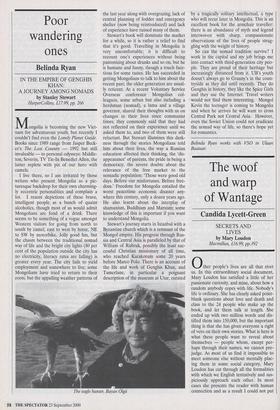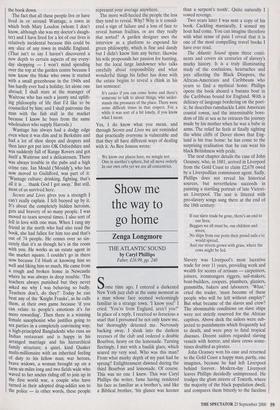The woof and warp of Wantage
Candida Lycett-Green
SECRETS AND LIVES by Mary Loudon Macmillan, £16.99, pp.392 Other people's lives are all that rivet us. In this extraordinary social document, Mary Loudon has satisfied a little of her passionate curiosity, and mine, about how a random anybody copes with life. Nobody's life is ordinary. She has clearly asked point- blank questions about love and death and class to the 24 people who make up the book, and let them talk at length. She ended up with two million words and dis- tilled them into 150,000, but the important thing is that she has given everyone a right of veto on their own stories. What is here is what these people want to reveal about themselves — people whom, except per- haps through their names, we cannot pre- judge. As most of us find it impossible to meet someone else without mentally plac- ing them in some social category, Mary Loudon has cut through all the formalities with which we English tentatively and sus- piciously approach each other. In most cases she presents the reader with human connection and as a result I could not put the book down.
The fact that all these people live or have lived in or around Wantage, a town in which both Mary Loudon (whom I don't know, although she was my doctor's daugh- ter) and I have lived for a lot of our lives is relatively incidental because this could be any slice of any town in middle England. (That isn't to say I haven't discovered a new depth to certain aspects of my every- day shopping — I won't mind spending over the top at the garden centre because I now know the bloke who owns it started with a small greenhouse in the 1940s and has hardly ever had a holiday, let alone one abroad; I shall stare at the manager of Waitrose who has such a jaunty and uplift- ing philosophy of life that I'd like to be counselled by him; and I shall patronise the man with the fish stall in the market because I know he buys from the same wholesalers who supply Harrods.) Wantage has always had a dodgy edge even when it was dim and in Berkshire and had a lot of shoe shops and drapers and then later got put into OK Oxfordshire and was suddenly full of Range Rovers and got itself a Waitrose and a delicatessen. There was always trouble in the pubs and a high crime rate. Ian Mould ('Mouldy'), who has now moved to Guildford, was part of it: Vantage culture; drinking, fighting, that's all it is ... thank God I got away.' But still, most of us survived here.
Secrets and Lives gives you a strength I can't really explain. I felt buoyed up by it. It's about the completely hidden heroism, guts and bravery of so many people. I was moved to tears several times. I also sort of fell in love with one man. When I rang my friend in the north who had also read the book, she had fallen for him too and that's out of 74 people. He comes over so sin- cerely that it's as though he's in the room with you. He works as an estate agent in the market square. I couldn't go in there now because I'd blush at knowing him so well and liking him so much. He came from a rough and broken home in Newcastle where he was always in deep trouble: 'The teachers always punished but they never asked me why I was behaving so badly. Teachers don't, do they?' Today he can beat any of the 'Knight Franks', as he calls them, at their own game because 'if you can relate to people's emotions it's far more rewarding'. Then there is a winning female saxophonist who justifies going to sex parties in a completely convincing way; a high-principled Bangladeshi who runs an Indian restaurant and is happy in his arranged marriage and his hierarchical family structure; a quiet, kind Quaker multi-millionaire with an inherited feeling of duty to his fellow man; war heroes, brave widows, a woman brought up on a farm six miles long and two fields wide who waved to her uncles riding off to join up in the first world war, a couple who have turned in their adopted drug-addict son to the police — in other words, these people represent your average anywhere.
The more well-heeled the people the less they tend to reveal. Why? Why is it consid- ered a sign of failure and a loss of face to reveal human frailties, or are they really- that sorted? A garden designer uses the interview as a platform to expound his green philosophy, which is fine and dandy but I didn't know him any better; likewise his wife propounds her passion for hunting, but the local large landowner who talks carefully about responsibility and what wonderful things his father has done with the estate begins to reveal a chink in his last sentence:
It's easier if you can come home and there's someone to talk to about things, who under- stands the pressures of the place. There were some difficult times in that respect. For a while it was sort of a bit lonely, if you know what I mean.
Yes, I do know what you mean, and through Secrets and Lives we are reminded that practically everyone is vulnerable and that they all have different ways of dealing with it. As Ben Jonson wrote:
We know our places here, we mingle not One in another's sphere, but all move orderly In our own orbs yet we are all concentrics.























































































 Previous page
Previous page